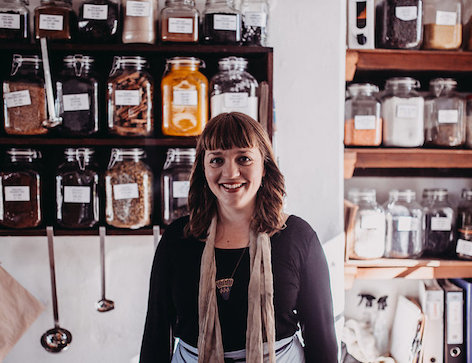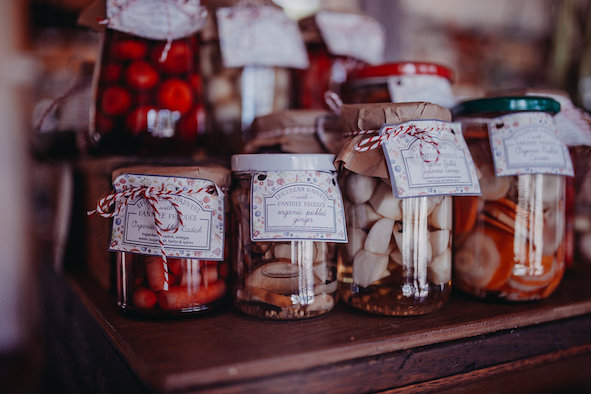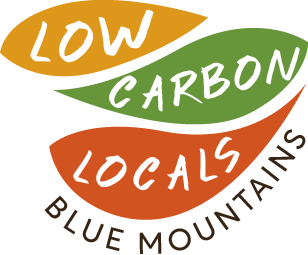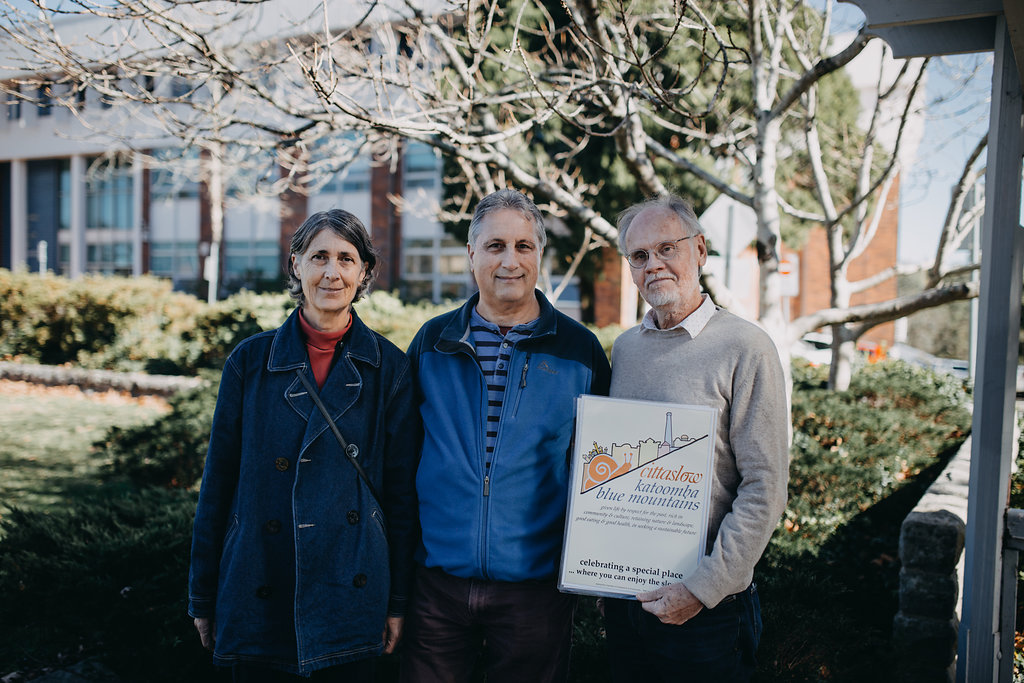In 2007 Katoomba was the first Australian community declared a Cittaslow International town, for its commitment to improving residents quality of life. Goolwa (S.A) and Yea (Vic), have also joined 233 Cittaslow cities globally to slow life down, highlight and protect local unique natural environments, promote local history, culture and creativity, and share locally sourced food,. Local sourcing of food and processing of waste are essential aspects to reducing the carbon load associated with transporting and processing food and waste around the country and globally.
As an evolving part of the Slow Food philosophy, Cittaslow is embracing a slower more meaningful lifestyle that brings people together around common goals to create quality of life for the whole community.
Sue Bell (BMCC Principal Urban Designer), Anne Elliott (Slow Food convenor) and Janet Cahill (Katoomba Chamber of Commerce & Community) collated Katoomba’s membership application. Eco architect Nigel Bell is the Cittaslow convenor. “Katoomba has an established genuine community”, says Nigel, so meeting Cittaslow critera wasn’t difficult. “This community embraces the Cittaslow philosophy. One of the biggest challenges is bringing everyone together to achieve common goals,” says Anne Elliott.
Cittaslow acknowledges all individuals, groups and organisations that work to build Katoomba’s positive community life that enables self-sufficiency community care and inspiriation. Each Blue Mountains town and village is unique, aesthetically different, with individual charm and characteristics. Katoomba has environmentally unique and sustainable resources, infrastructure and architecture; diverse history and culture; eco-gastronomic retail and dining options; and progressive arts and cultural.
Cittaslow Katoomba is supporting an R6 Character Residential Zone town plan to enable ‘character conservation’ under the BMCC. R6 stipulates new and existing R6 zoned properties must preservc the character and aesthetic qualities of the original architecture. R6 was recently approved by the Department of Planning, BMCC are the first NSW LGA to implement it.
Sue Bell emphasises that “whilst the Blue Mountains World Heritage listing was for ecological values, Katoombas character is fundamental to the tourism industry and residents quality of life”. Nigel Bell explains “visitors are attracted to ‘Mountains charm’ of old established gardens, and characteristic ‘old world’ ‘streetscapes’ ” says. Cittaslow Katoomba hosted a study tour of a ‘Cittaslow’ town for a South Korean delegation in May 2017 and hold the October ECOhomes Tour annually for designers, builders and renovators to learn about and be inspired by eco-friendly Blue Mountains homes.
Nyla Thomas of TCP Day Tours runs the Good Food and Wine Tour and the Farmgate Tour all year round to immerse visitors in our unique and spectacular Blue Mountains; to take the time to experience the culture, people, views, fresh and wonder of the region. 
Lawson’s Lyttleton Stores practices Cittaslow principles and is the epitome of the Blue Mountains lifestyle. ‘Lyttleton’ is the original name of the 1884 historic building , which was well looked after as a grocery store by previous owners, and survived a 1920s fire. Current custodians Lawson sisters, Jacinta (pictured) & Adelina Carmichael-Parissi delight in visits from people who lived or worked at the property when milk was delivered in bottles and where a carving etched in the 100 year old magnolia tree still stands.

Every step of food production at Lyttleton, from seed to consumption, is mindful of waste, resourcefulness and holistic practices. Lyttleton Stores offers local seasonal organic produce, A register lists Blue Mountain growers and an active network of growers for the store. ‘Bi-monthly Growers Meet Up’ provides an opportunity to share collective knowledge, exchange experiences and provide support.
Some produce is supplied from Lyttleton’s garden. Currently walnuts and oranges have been harvested, and apples are drying. At the beginning of each season the garden is open to the public and workshops, including cookery classes, are tailored for backyard gardens. . Surplus food is used to produce preserves, pickles, baked goods and stock. Scraps are composted Coffee grinds cultivate mushrooms and restaurant food waste is composted. Jacinta explains the wide range of available produce “is grown and produced in Australia, preferably NSW, and ideally from the Blue Mountains”. In Lyttleton’s ‘the Atelier’ Australian artists and craftspeople exhibit handmade items for sale.
Jacinta and Adelina are investing in solar panels and batteries. They have applied for a grant to install a water tank, and are phasing out packaging. Lyttleton’s Stores long-term goal is to extend ownership to a community a co-operative, working toward common goals to encourage healthy lifestyles and a sustainable future.

